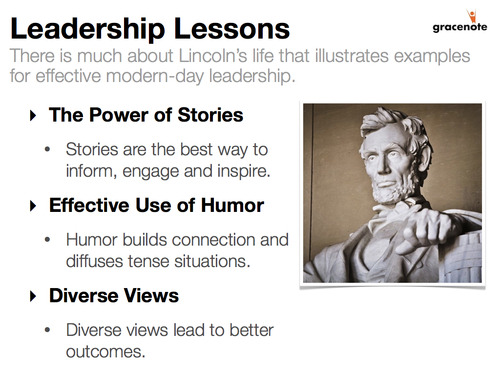As we celebrated President’s Day earlier this week I took some time to contemplate the life and legacy of Abraham Lincoln and began to think more about the many examples of his powerful and effective leadership.
I live in Richmond, where Steven Spielberg filmed much of Lincoln and where renewed interest in Lincoln has increased with the release of the film last year. I had the good fortune to see Spielberg, along with historian Dorris Kearns Goodwin and screenwriter Tony Kushner, speak about Lincoln and their film when they recently came to our Richmond Forum speaker series. I’m also reading Godwin’s book on Lincoln, Team of Rivals.
With this exploration of Lincoln’s life, I began to get a richer, fuller picture of this complex man—his strengths and weaknesses, his successes and failures. Lincoln is perhaps one of the greatest historical figures we can study in order to glean leadership virtues.

The Power of Stories
One of the best lessons for business people and marketers is Lincoln’s gifted use of stories. In the 1800s storytellers provided an important form of entertainment in an era before widespread literacy, radio, television and the Internet. As a young man, Lincoln was widely recognized as a master storyteller who brought art and humor to gatherings as he traveled. And, Lincoln carried this art of storytelling with him into the political sphere. For example, in many speeches Lincoln applied the biblical metaphor that “a house divided against itself cannot stand” to a United States divided by the issue of slavery. It was an exceptionally compelling way to communicate an image of the U.S. as a house in danger of collapse due to the pressures of the slavery issue. Lincoln’s example is yet another reminder that when it comes to connecting with people—whether motivating voters, engaging with customers, or inspiring employees—stories and metaphors trump facts and figures.
Humor
Most of us today think of Lincoln and think of a solemn and serious man dealing with the pressures of a terrible war: the Lincoln who delivered the Gettysburg address. But there was another side to Lincoln that’s less well known. Lincoln had an incredible sense of humor that he used to put people at ease, connect with others, and diffuse tense situations. If you’ve seen the film, Lincoln, you likely remember Lincoln telling of one of his favorite jokes about Ethan Allen’s trip to England. Lincoln used stories and jokes such as that on a regular basis, and he came alive when telling them in ways that endeared him to his audience, broke the tension, and encouraged stronger relationships. There is a strong connection between humor and humility, and some have called humor the most underrated leadership characteristic.
Diverse Views
Lincoln was a humble yet confident leader. He invited his political rivals, who brought very different ideas and opinions, into his cabinet. Several of the men in Lincoln’s cabinet had been his rivals for the Republican presidential nomination, and the cabinet represented diverse views, from conservative to moderate to radical. Lincoln knew that by keeping those diverse strands together in his cabinet he could keep them together across the country. Lincoln possessed emotional strengths that allowed him to invite these diverse views while also holding the group together with a deep sensitivity to managing relationships. Today, most organizations recognize that leveraging diverse perspectives enriches learning, inspires innovation, and leads to better outcomes. Lincoln presents an example of emotional strength that helps leaders seek out diversity and manage the relationship issues that sometimes accompany disagreement.
Each of us brings our own unique self to the opportunity and challenge of leadership—our unique history, personality, behaviors, and strengths. None of us can be like Lincoln exactly, but we can adopt many of his best leadership behaviors. Since his death, countless political, business and community leaders have looked to Lincoln for example and inspiration. By studying his life, it is possible to understand some of the behaviors that made him such a great leader. However, the process of applying those examples ourselves can take many years of effort and reflection. By looking inward and through trial and error, we can hone our ability to craft stories that inspire others, we can cultivate a sense of humor and skillfully deploy it at just the rights moments, and we can develop an inner strength, confidence and kindness that helps us cultivate relationships and encourage diversity. The goal is not easy. But perhaps the greatest lesson from Lincoln’s life is that achieving the most important goals never is.
If you’d like to learn more about Lincoln’s life, here are two of my favorite books:
Team of Rivals: The Political Genius of Abraham Lincoln by Dorris Kearns Goodwin
April 1865: The Month that Saved America by Jay Winik



